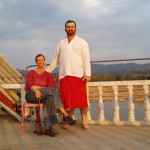Review — CROCODILE LOVE by Joshua Berman (Nicaragua 1998-2000)
 Crocodile Love: Travel Tales from an Extended Honeymoon
Crocodile Love: Travel Tales from an Extended Honeymoon
by Joshua Berman (Nicaragua 1998–2000)
Tranquilo Travel Publishing
294 pages
2015
$17.95 (paperback), $4.99 (Kindle)
Reviewed by Peter Deekle (Iran 1968–70)
•
When I served in Peace Corps/Iran in the late 1960s, I was urged to share my experiences with others upon my return to the United States. Joshua Berman has fully accomplished this through his monthly column in The Denver Post, his five previous travel books, his blog and website, many articles in The New York Times, National Geographic Traveler and other publications.
Crocodile Love: Travel Tales from an Extended Honeymoon is Berman’s first narrative travel book, and one that not only vividly describes exotic locales, but also draws the reader into a compelling and extended story. The book makes the mysteries of different cultures both accessible and personal. As the author says early on in the book, “Everything about our beginning [as a newly married couple] was defined by travel.”
Josh Berman and his wife, Sutay, shared the common experience of Peace Corps service (his in Nicaragua and hers in The Gambia). And yet, their service environs were culturally and geographically worlds apart. Choosing to channel their time and wedding dollars toward an extended trip abroad, before the continual demands of family and employment, reminds me and my own Peace Corps Volunteer wife (whom I met while serving in Iran) of an oft-cherished notion to contain all our worldly possessions in a single government-issued trunk!
were culturally and geographically worlds apart. Choosing to channel their time and wedding dollars toward an extended trip abroad, before the continual demands of family and employment, reminds me and my own Peace Corps Volunteer wife (whom I met while serving in Iran) of an oft-cherished notion to contain all our worldly possessions in a single government-issued trunk!
Berman and his wife travel with the structure of a desire to visit the Pakistani roots of her grandparents, leading them to Rawalpindi and the Gordon School. They encounter the contrasting role of women in Pakistani and Indian cultures along the way. And, they witness that “shared and rare synchronicity” that marriage can provide.
In Lahore, on Sufi Night, the two encounter the “risk and reward” of religious and social customs. By both inclination and necessity, their accommodations throughout the journey immerse them in the moment — beyond the surface encounters of tourists — reflecting the very nature of their previous Peace Corps lives.
A multi-week volunteer commitment with Indian tea workers in West Bengal through the American Jewish World Service establishes their daily duties and reveals the “quiet, hot despair” of the workers. While friendships abound at the tea plantation, the pair also witness severe sickness and death among the local population.
Following several months in India they backpack toward temporary clinical work in Accra. Each of them employs the experience and skills from their former Peace Corps training and service. And, amid Ghana’s “hidden charms,” they reflect on “job, mortgage, car insurance, HOA meetings . . . still in our impossible future.”
The book’s title references the couple’s final journey to Sutay’s former Peace Corps African site in The Gambia. How often many Returned Peace Corps Volunteers hope to one day revisit their sites abroad! Following traditions, they visit a preserve where sacred crocodiles offer the promise of fertility.
While in The Gambia, they also meet a serving Peace Corps Volunteer. “There is something about seeing a Volunteer, deep in his service — totally in his element, his moment — that inspires.” The author concludes, “I always seek active Volunteers during my travels.”
Joshua Berman expertly merges a riveting tale of adventure with the acute perceptions of a seasoned traveler. His observations of interpersonal relations, local customs, and evolving politics in the region provide non-judgmental insights. The reader of this book cannot help but become a companion in this journey of self-discovery.
•
Peter Van Deekle (Iran 1968-70) began his Peace Corps service informally in the summer of 1963, as a teenage volunteer at headquarters in Washington, D.C. From that time onward he planned to serve abroad, and joined the 20th group of Volunteers to Iran in 1968, following graduation from the University of Pennsylvania (which, coincidentally, was highly influential in shaping many of Pahlavi University’s [Shiraz] departments and institutions. Deekle met his wife, Barbara Maier (Iran 1968–70) during service and both taught English in local schools. He has been an administrator in a variety of public and private colleges and universities since his return to the United States and currently, having retired to the Washington, D.C. area, he and his wife live near one of their children.
No comments yet.
Add your comment